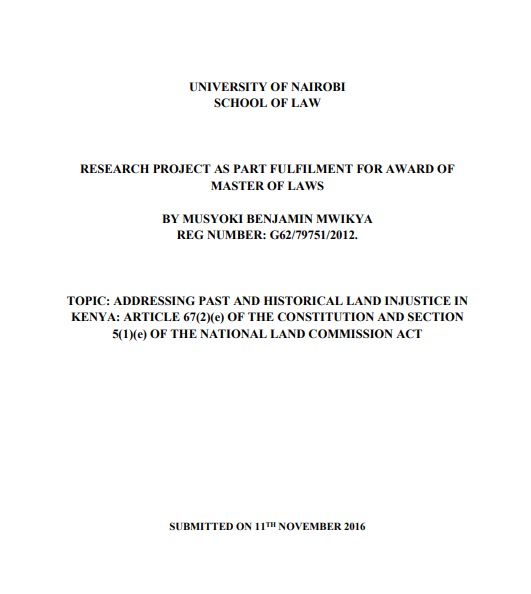Resource information
Land is in no doubt the most important asset in the lives of Kenyans. It is a factor of production which is core to the economic activities of this country. The advent of settlers and colonialism in East Africa placed land in a high level of importance than before. It is not a unique situation for Kenya. Wars have been fought world over with ownership of land and other resources associated with it being at the center of controversy. When colonialism set in, many people were displaced from their original homes. After the Second World War indigenous Kenyans discovered that their land had been systematically taken away form them. This saw the beginning of vicious war between the indigenous Kenyans and the colonial government. After independence it was felt that the atrocities committed against indigenous Kenyans as far as land was concerned would be remedied. It never came to pass as the original owners of the eland which had been taken away were not the beneficiaries of the independence. Since independence there have been calls by Kenyans, politicians, leaders and other stakeholders for new land law regimes. Land law reforms have been piecemeal and of no positive results for ordinary Kenyans. Instead of restitution or remedy, more land injustices have been committed against Kenyans after independence. In late 1988 and the early 1190s fight for law reforms was rejuvenated and for more than a decade solutions seemed to be elusive. In 2010 Kenyans passed a new Constitution which saw reforms and overhaul of the land laws system achieved. Among hopes in the new Constitution was introduction of Article 67 of the Constitution which set up a National Land Commission and defined its functions. In 2011 the Parliament passed National Land Commission to give effect to Article 67 of the Constitution. One of the functions of the NLC as set out in the legal instruments was to investigate and make recommendations in respect present and past historical land injustices. It was hoped that these provisions of law were adequate to give the NCL enough powers and instruments in addressing past and historical land injustices sin the country. Since its establishment in 2011 the NLC has not done much in this field. This paper is set to look at what the NLC would be expected to do in order to discharge its mandate under Article 67(2)(e) of the Constitution and section 5(1)(e) of the National Land Commission Act. Chapters 1 and 2 deal with definition and discussion on land injustices in this country while chapter 3 ad 4 discusses the laws NLC should use in addressing the issues and recommendations.

